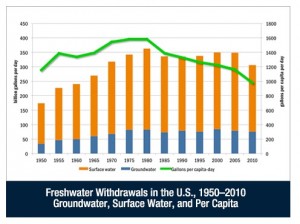
Water use is dropping, both per capita and in total. Courtesy Gary Woodard, Montgomery and Associates
Gary Woodard argues that we need to stop worrying so much about running out of water and do a better job instead of planning for the fact that we’re using less:
Stories about the alarming state of water in the West seem to be everywhere. Prolonged drought, scant snowpacks, receding reservoirs, rampant groundwater overdraft, and devastating forest fires all fuel the debate about whether, and to what degree, climate change may be reducing our water supplies. The sense of gloom is deepened by stories about the challenges of supplying ever-increasing water demands. These articles — many penned by east coast journalists — cite growing populations and new water uses, including sustainable energy production and environmental mitigation efforts. They often reflect a belief that sprawling, desert cities are inherently unsustainable
Fortunately, these stories are dead wrong. Rather than struggling to meet growing demands, many Western water providers have been surprised, perplexed, and even challenged by decreasing demands, which have shrunk revenues, left infrastructure unused, and confounded long-term planning.

Woodward fails to address supply variability and the risks associated with that variability of suppliers being able to deliver the volume and quality of water needed for specific end uses. So, while Western water suppliers may be “surprised, perplexed, even challenged,” what are they doing to plan for possible increased risk in the future under climate change? Designing and constructing new of augmented infrastructure suffers from the potential reduced volume of water that might flow into or along them. While the east coast Cassandras are dismissed, none of the areas Woodward mentions, e.g., drought, scant snowpack, are outside currently known physical conditions. Also, these topics are known to occur on the east coast. Whether and how frequently they and other areas might reappear should be of interest to those that are based on Tucson.
I second Marc Kodack’s comment. The differences between regions are crucial.